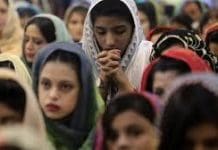By BosNewsLife Asia Service

NEW DELHI, INDIA (BosNewsLife)– Devoted Christians in India’s southwestern state of Karnataka have begun the New Year amid uncertainty about the future of several churches after Hindu militants halted worship services, a Catholic watchdog said.
In a statement, seen by BosNewsLife Saturday, January 7, the Catholic-Christian Secular Forum (CSF) said activists of the hardline Hindu group Bajrang Dal disturbed a New Year’s Day prayer service of the evangelical Blessing Youth Mission Church in Humnoor, a suburb of the main Jamkhandi town.
CSF explained that Pastor Siddu Seemanth Gunike was among several believers who were “physically attacked by about 20 Bajrang Dal Hindu fanatics” on January 1.
The group said the Hindu mob arrived “in the middle of the prayer service”, which was held at a church member’s home, and ordered the Christians to stop the meeting.
The violence came as a major setback for the 42-year-old Gunike, a married father with two children, who has led the 80-strong congregation for the last 15 years, CSF added. There was no immediate comment from Bajrang Dal, but the group is among several Hindu organizations known to have attacked churches.
MORE VIOLENCE
Elsewhere in Kanataka, the Karnataka Calvary Fellowship Church in the town of Ganeshgudi was attacked on New Year’s Eve, according to CSF investigators. CSF quoted Pastor P.R.Jose as saying that the attack happened while most people of his 70-member church attended the December 31 gathering.
“Just when the congregation was fully immersed in the prayer service, about a dozen [activists of the Hindu group] Sangh Parivar…forced themselves into the church and ordered them to stop their prayer service,” CSF said.
The Hindu mob allegedly interrogated each member and hurled “abuse at them alleging that they were involved in fraudulent and forcible conversion of Hindus to Christianity.”
Police reportedly arrived but CSW claimed they joined the Hindu militants in threatening believers “with dire consequences if they continued with their conversion work.”
EVANGELICAL CHRISTIANS
Evangelical Christians have denied they are involved in “forcible conversions” saying the Bible speaks about a voluntary personal decision to follow Jesus Christ.
“After forcing the believers to stop the prayer service, the policemen ordered the pastor to come to the police station the next morning and went away with the Sangh Parivarists,” CSF reported. It was not immediately clear whether the pastor, who is married with two children, had visited police.
Another advocacy group, the Karnataka-based Global Council of Indian Christians (GCIC), said there were at least six similar anti-Christian attacks between Christmas Eve 2011 and New Year’s Day in the state, inuring several believers.
Officials had no comment. With at least 49 cases of violence and hostility against Christians in 2011, Karnataka remained the state with the most persecution incidents of Christians, said the Evangelical Fellowship of India, an umbrella organization of evangelical churches, in its annual report, “Battered and Bruised…”
There have been attacks reported against churches across in India, a mainly Hindu nation of over 1 billion people where Hindu groups have expressed concerns about the spread of Christianity in the country.









bow. bow… vow, vow vow vow…
halleluya.. halleluya… halleluya press.. spreading lies lalleluya… 😀
Chaitra Krushna Pratipada
London: More than 100,000 Britons have recently downloaded “certificates of de-baptism” from the Internet to renounce their Christian faith.
The initiative launched by a group called the National Secular Society (NSS) follows atheist campaigns here and elsewhere, including a London bus poster which triggered protests by proclaiming “There’s probably no God.”
“We now produce a certificate on parchment and we have sold 1,500 units at three pounds (4.35 dollars, 3.20 euros) a pop,” said NSS president Terry Sanderson, 58.
John Hunt, a 58-year-old from London and one of the first to try to be “de-baptised,” held that he was too young to make any decision when he was christened at five months old.
The male nurse said he approached the Church of England to ask it to remove his name. “They said they had sought legal advice and that I should place an announcement in the London Gazette,” said Hunt, referring to one of the official journals of record of the British government.
So that’s what he did — his notice of renouncement was published in the Gazette in May 2008 and other Britons have followed suit.
Michael Evans, 66, branded baptising children as “a form of child abuse” — and said that when he complained to the church where he was christened he was told to contact the European Court of Human Rights.
The Church of England said its official position was not to amend its records. “Renouncing baptism is a matter between the individual and God,” a Church spokesman told AFP.
“We are not a ‘membership’ church, and do not keep a running total of the number of baptised people in the Church of England, and such totals do not feature in the statistics that we regularly publish,” he added.
De-baptism organisers say the initiative is a response to what they see as increasing stridency from churches — the latest last week when Pope Benedict XVI stirred global controversy on a trip to AIDS-ravaged Africa by saying condom use could further spread of the disease.
“The Catholic Church is so politically active at the moment that I think that is where the hostility is coming from,” said Sanderson. “In Catholic countries there is a very strong feeling of wanting to punish the church by leaving it.”
In Britain, where government figures say nearly 72 percent of the population list themselves as Christian, Sanderson feels this “hostility” is fuelling the de-baptism movement.
Theologian Paul Murray at Durham University disagrees. “That is not my experience,” he said, but concedes that change is in the air.
“We are in an interesting climate where Catholicism and other belief systems have moved into the public, pluralist arena, alongside secularists,” he said.
De-baptism movements have already sprung up in other countries.
In Spain, the high court ruled in favour of a man from Valencia, Manuel Blat, saying that under data protection laws he could have the record of his baptism erased, according to a report in the International Herald Tribune.
Similarly, the Italian Union of Rationalists and Agnostics (UAAR) won a legal battle over the right to file for de-baptism in 2002, according to media reports. The group’s website carries a “de-baptism” form to facilitate matters.
According to UAAR secretary Raffaele Carcano, more than 60,000 of these forms have been downloaded in the past four years and continue to be downloaded at a rate of about 2,000 per month. Another 1,000 were downloaded in one day when the group held its first national de-baptism day last October 25.
Elsewhere, an Argentinian secularist movement is running a “Collective Apostasy” campaign, using the slogan “Not in my name” (No en mi nombre).
Sanderson hopes rulings in other European countries will pave the way for legal action in Britain, since European Union directives require a level of parity among member states’ legislation.
“That would be a good precedent for us to say to the British Information Commissioner: Come on, what’s your excuse?” said Sanderson.
The bus-side posters that hit London in January sported the message: “There’s probably no God. Now stop worrying and enjoy your life.”
The scheme was in response to pro-Christian adverts on buses directing passers-by to a website warning those who did not accept Jesus would suffer for eternity in hell.
Comedy writer Ariane Sherine, mastermind of the British bus campaign that saw a copycat version in Barcelona and other cities, said she backs the “de-baptism” movement but insisted the two initiatives were separate.
Sanderson meanwhile remains resolute. “The fact that people are willing to pay for the parchments shows how seriously they are taking them,” he said.
The State of Karnataka is not taking any serious steps in the attacks of the Christian
minority there, which is being watched by the Christian community around the world.
The police is not protecting the persecuted but tormenting them further, that makes the
situation far worse.